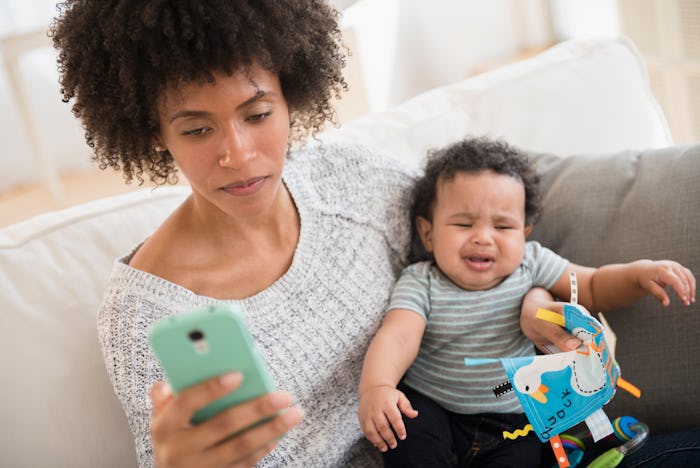Parenting

How To Fight Parental FOMO (Even In A Pandemic )
We know that we should stay home, but not everyone plays by the rules.
One uncomfortably warm day this October, I packed my diaper bag, dressed my 18-month-old in a seasonal outfit, and drove us to a farm about 60 minutes west of our house for some “fall fun.” I had a feeling that fall fun was overrated, but I’d been inundated with photos of families posing with pumpkins for weeks. What kind of new mom would I be if I didn’t snap a picture of Abby on a hay bale? And wouldn’t she love the petting zoo? (She would not.) Sure, there’s a pandemic going on, but it's a farm, it’s outside, so how bad could it be?
When we arrived at said farm on a weekday afternoon, it was hot and crowded… and the pumpkin patch that had flitted through my mind for weeks? No longer in existence. We meandered through an emaciated corn maze, asked a stranger if she felt comfortable snapping a picture of us on a truck bed (she did), then headed home.
As I drove a crying, sticky toddler the reverse 60 miles, trying to soothe her with a 20-animal rendition of Old MacDonald, I realized that I had succumbed to FOMO: the fear of missing out.
Yes, even in a pandemic, parents are vulnerable to FOMO. We know that we should stay home, but as businesses reopen and people start to venture out to do things like travel or gather for holidays, those feelings of missing out creep back up.
Siobhán Alvarez Borland, an Atlanta-based mom of two toddlers and the blogger behind Mimosas & Motherhood, can totally relate. “As parents, we’re all in a really tough spot. Because there’s no consistent messaging across the board on what we should all be doing,” says Alvarez Borland. “And so it very much feels like we’re all left to figure out what the best decision is for our individual families.”
In her case, that means being strict about social distancing so her family can frequently spend time with her mother, who is immunocompromised. She knows it’s a decision worth making, but that doesn’t make seeing the pictures of other families’ Christmas outings any easier. The thing she’s missing most this year? Seeing Santa in person. “It’s just a special, magical thing with really young children, and we don’t have that window for very long with them,” she says. “That’s the thing I’m feeling the most guilt around and the most FOMO.”
When it comes to combating these very real concerns about losing out on limited precious moments, it’s important to remember that we’re always modeling behaviors for our kids, says Graziella Simonetti, a Long Island parenting coach. “So it's helpful to talk, even with the little ones and especially with the older ones. Say, ‘I know that it's a hard choice when we can't go somewhere, but one day you may be around people doing something that's unsafe or something you're uncomfortable with;’” says Simonetti. “Tell them, ‘Remember this choice we made today. It’s a hard choice, but it’s the right choice.'”
Something that tends to be part and parcel of FOMO is the disapproval we feel of what others are doing. That visceral feeling of Ugh! I can’t believe they’re doing that!, when you scroll past the photos — even though it’s totally something you wish you could be doing. It’s not outrageous to think that maybe people shouldn’t get pictures with Santa during a pandemic, even if he’s wearing a face mask or face shield, but sometimes the judgment of other families can dominate our emotions. Which makes sense, people’s unsafe behaviors are prolonging the pandemic, but their actions are also out of our control, so dwelling on them isn’t productive.
You have to feel confident that the decisions that you're making, even if you feel like you're missing out on things, are the right decisions for your family and for your children.
If it’s not something that immediately puts you and your family at risk, then it’s important to disconnect from those judgmental feelings that are only serving to make you unhappy, says Simonetti. Try telling yourself something like, “That's their choice. They're entitled to their choice. I'm entitled to my choice. I'm entitled to my opinion.” She also suggests a mindfulness activity of imagining your reaction as a cloud that just passes by without taking up any more energy or time.
One thing that has helped Alvarez Borland during this time is remembering that the pandemic is completely out of our control. “Everyone's situation is different, and you have to feel confident that the decisions that you're making, even if you feel like you're missing out on things, are the right decisions for your family and for your children,” she says
Ever since that October day where I was reminded that things aren’t always all they’re cracked up to be, I’ve been leaning more into the feeling of JOMO (joy of missing out) rather than FOMO. Pictures with Santa in a hazmat suit? Not for me. Introducing my daughter to the joys of holiday crafts is more our speed this year.
But sometimes, like when I spotted a photo on IG of a family at Disney taking in the holiday magic (albeit with masks), those feelings can catch me off guard like I’m Buddy the Elf winding up the Jack-in-the-Box, and I have to remind myself that this is temporary. As Simonetti says, “Keep in mind that this is just a season.” That doesn’t mean it's not hard, because it is. “It's so hard. I mean, I'm not minimizing it,” she says. "It's a very hard time to be a parent, but there is an end to this. It's coming."